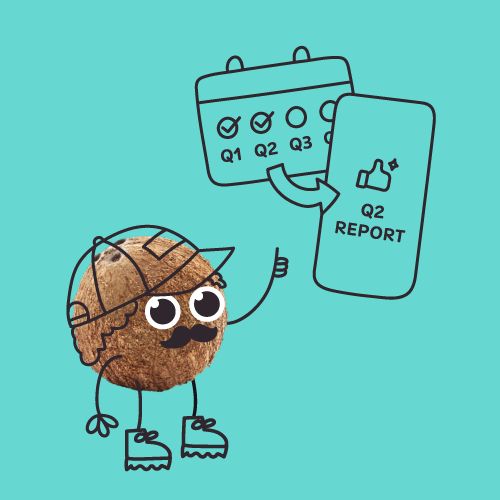Most freelancers will probably experience a client who doesn’t pay on time at some point in their career. It’s an unfortunate aspect of the job, and can happen to anyone, especially those just starting out as freelancers. So how do you deal with these clients? It may be tempting to just let things slide for a number of weeks, as you don’t want to upset your client; or on the other hand, you may want to jump in with all guns blazing, demanding your payment immediately. Neither of these tactics are particularly effective. The key is finding a balance, which ensures the best outcome for both you and your client.
When should I chase a client?
3-7 days overdue – email reminder
If payment is only a day or two late, it makes sense to give your client the benefit of the doubt – perhaps they’ve been out of the office, or off sick. Just send a friendly email to remind them that your payment is due.
1 week overdue – follow up with telephone call
If a week has passed and you still haven’t heard anything, follow up your email with a quick call. At least if you speak to your client directly they can’t ignore you, as they can with an email.
Ask to speak to accounts department directly
If you don’t hear back from your client following the phone call, the next step is to contact the accounts department directly. Either ask for their contact number, or search for it on the company website.I once worked for a client, who would always delay payment for weeks at a time. I contacted the accounts department, and it turned out that they weren’t receiving my invoices. I was sending them to my coordinator, who wasn’t forwarding them on. I managed to get a direct email address for the accounts team, which cut out the middle man – and from then on every invoice was paid on time!

Escalating your case
Of course, you want to try and keep your client on-side whenever possible. Nine times out of ten it can be resolved amicably, and won’t jeopardise any future work with that client. However, if payment is regularly late, or if the above steps have had no response, then it’s time to escalate your case.
Refuse to do any more work until your bill is settled
If you haven’t been paid for the work already completed, it doesn’t make sense to carry on working for that client. Tell your client that your work will be put on hold until you receive payment, and that might just be enough to prompt them into sending payment.If you do receive payment – that’s great. It’s then up to you whether to continue working with the client or not. Personally, I’d usually give the client another chance, but if it got to this stage again for a second time, then I’d be reluctant to continue working with them.
Threaten legal action
If you have exhausted all other options, then it’s time to go down the legal route. Sometimes threatening a client with legal action will be enough. It goes without saying, that once you take this step then you will be severing your working relationship with your client.
Speak to your lawyer
If the client doesn’t respond to your threat, then it’s time to speak to your lawyer. An official lawyer’s letter to your client will usually be enough to make the client pay up, as nobody wants to go to court.Remember, the legal route is only available if you have a written contract in place with your client. If not then, unfortunately, you may have to just let the client go, and chalk it up to experience.

Preventing late payments
As the old saying goes, “prevention is better than cure,” and nothing could be truer when it comes to dealing with freelance clients. Taking the steps to guarantee payment before you start any work will prevent the situation of non-payment ever arising and, not only that, but it will save you a great deal of stress in the long run.
1. Ensure you have a written contract including timescale and payment schedule
It may seem like overkill to sign a contract before you start working – especially if you’re relatively new to freelancing and are keen to get started straight away. However, experienced freelancers will tell you that this is absolutely essential, as most have probably learned the hard way. Having a contract, or at the very minimum a written agreement, gives you something to fall back on, should anything go wrong. If you have to go down the legal route then you won’t have a leg to stand on, unless you have a contract in place.
2. Consider late payment charges
This isn’t always necessary, but having late payment charges detailed in your contract is a sure-fire way to make sure your client pays you on time. Remember, these must be agreed before you begin work – you can’t just add them on after the invoice is already late!
3. Get a deposit up front
For larger projects, getting a deposit up front is a sensible thing to do, especially if it’s a new client you haven’t worked with before. For ongoing work, you may also consider block payments, where the client pays you in advance for an agreed amount of work. Then once the work is delivered you just send repeat invoices on a rolling basis as required.As is the nature of freelancing, dealing with clients comes down to experience. I’ve had to deal with the issue of late payment on numerous occasions, but thankfully, I’ve never had a client who hasn’t paid at all. As you gain more experience as a freelancer, you learn how to prevent these issues happening, and even learn how to spot the tricky clients from the outset.











